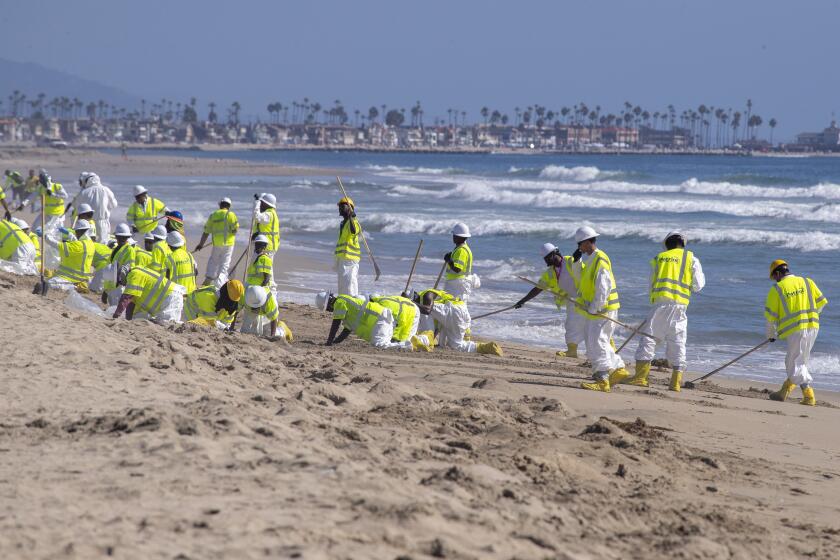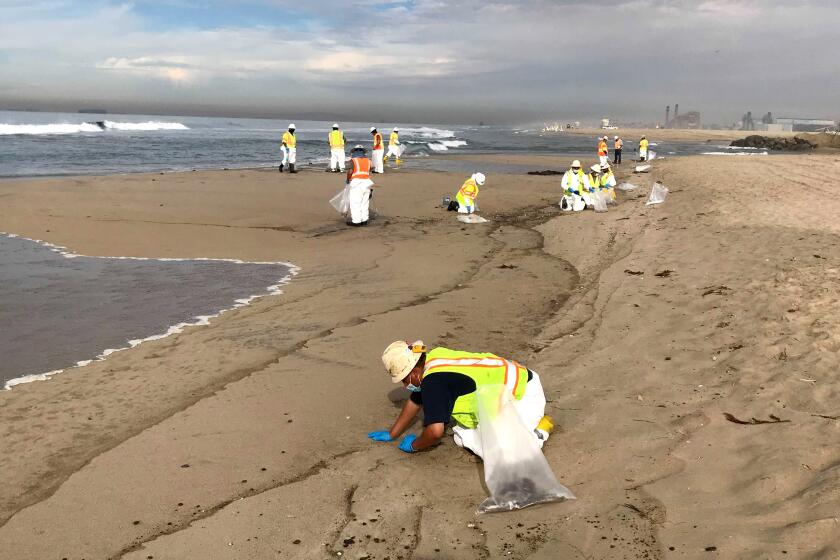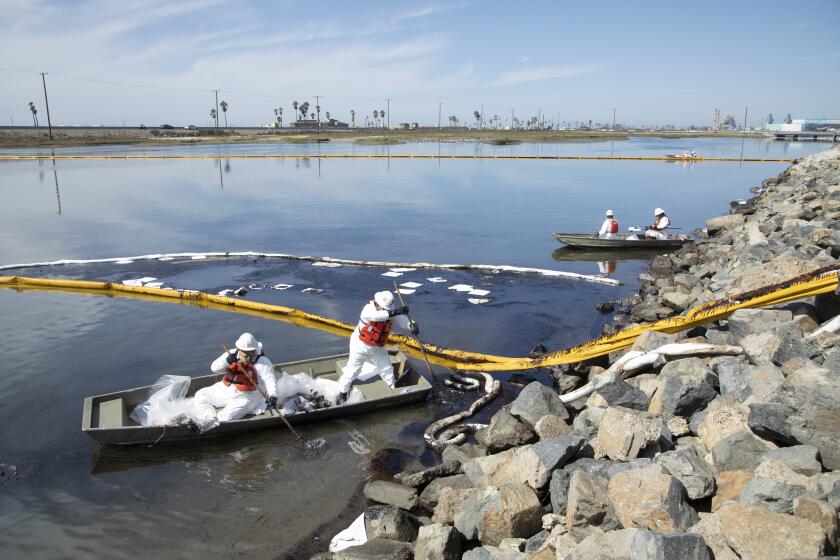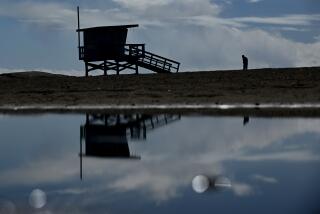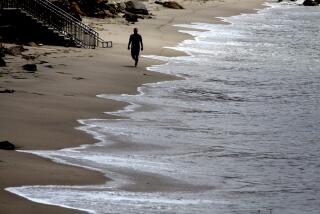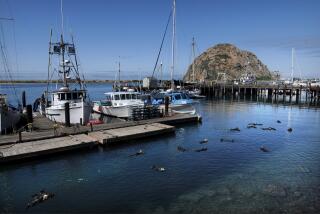Where is the Orange County oil spill moving, and which beaches are threatened?
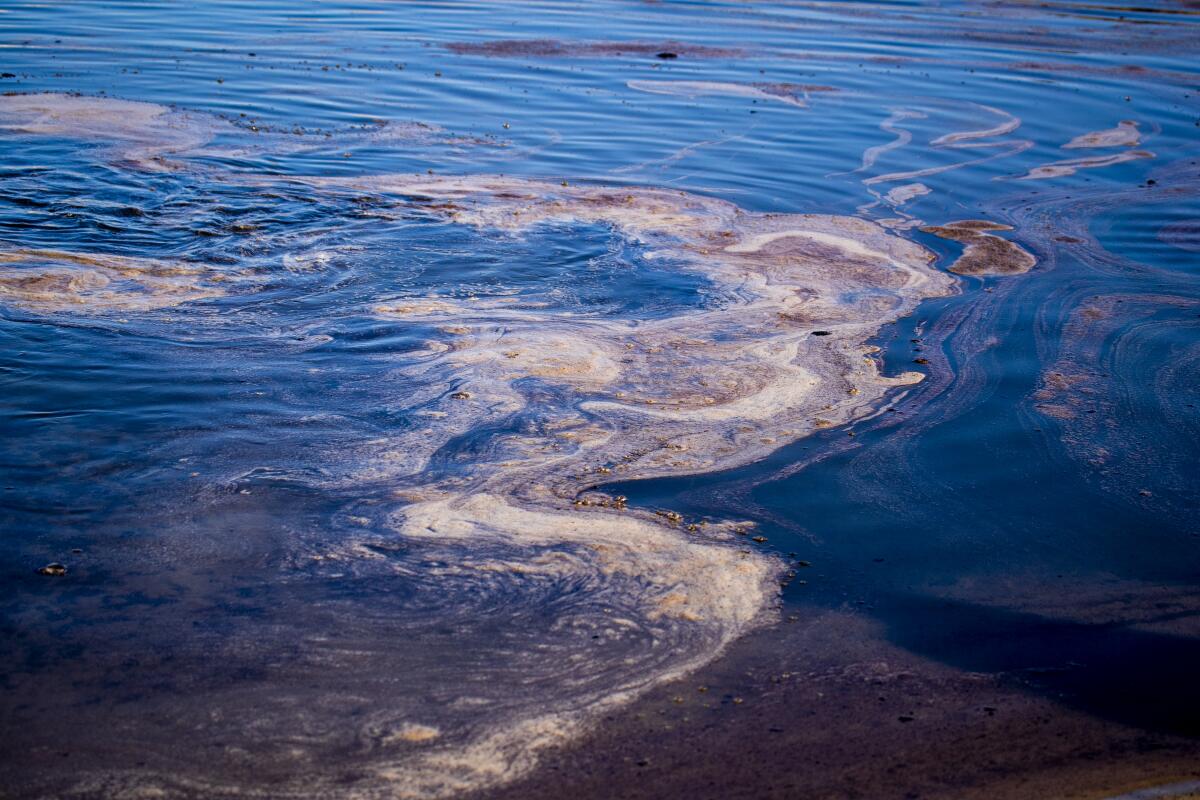
The massive oil spill from a 126,000-gallon leak off the Orange County coast is moving south, threatening marine protected areas as well as popular beaches.
The oil will likely continue to encroach on Orange County beaches for the next few days, officials said.
A massive oil spill off the Orange County coast has fouled beaches and killed birds and marine life
Here is a breakdown of what we know:
Newport Beach
Softball-sized clumps have washed ashore between the mouth of the Santa Ana River and 52nd Street. Much of the slick remains about a quarter-mile offshore, city spokesman John Pope said. Newport Beach officials closed the cityâs recreational harbor Monday morning in an effort to stem the spread of the oil.
âWe donât have oil in there right now, so a huge priority is keeping oil from getting into the harbor,â Pope said.
Newport Beach has not closed its beaches, but officials have asked people to stay out of the water. The Orange County Health Care Agency issued a health advisory Sunday recommending that those who may have encountered oil in the water seek medical attention.
A major oil spill off the coast of Huntington Beach, Calif., washed up on nearby Orange County beaches, killing fish and birds and threatening local wetlands.
Crystal Cove
The Crystal Cove beach had not reported any oil as of early Monday, but officials say that could change depending on the ocean currents throughout the day.
Coast Guard officials are flying over the spill three to four times a day to map the oilâs direction and compare it with tides, currents and winds to project the potential impact to beaches to the south.
âIt really is dependent on the prevailing weather conditions, but the oil continues to move in a southerly direction,â said Capt. Rebecca Ore, commander of the USCG Sector Los Angeles-Long Beach.
Officials had feared Sunday night that the slick was headed south, threatening the pristine marine area.
Laguna Beach
In Laguna Beach, officials say roughly golf ball-sized pieces of tar have washed up along Crescent Bay, a beach known for its distinctive cove that runs about a quarter-mile, where Cliff Drive intercepts North Coast Highway, and Shawâs Cove.
âRight now it varies. The oil clusters range from the size of a quarter to just particle-size droplets,â said Kevin Snow, chief of marine safety for Laguna Beach. âBeach closures are needed to protect the health and safety of the public and to allow contractors to begin oil cleanup.â
Laguna Beach closed city beaches Sunday night.
Divers are completing an intricate inspection of the pipelines on the sea floor, about 80 to 100 feet below the oceanâs surface.
Two contracted oil-recovery vessels known as skimmers worked off the coast of Laguna Beach overnight to prevent as much of the oil from coming ashore as possible, Snow said.
âThe entire city is a marine-protected area, which means we have sensitive marine habitat and wildlife here that is protected,â he said, âand we need resources to protect this unique ecosystem.â
Huntington Beach
So far, this cityâs coast has been hardest hit.
A 5½-mile stretch of sand in Huntington Beach from Seapoint Street near the Bolsa Chica wetlands to the Newport Beach city line at the Santa Ana River jetty remained closed Monday as crews continued cleanup efforts.
Crews deployed 2,050 feet of booms to try to stop further incursion and protect sensitive wildlife areas, including Talbert Marsh, a 25-acre ecological reserve across from Huntington State Beach that is home to dozens of species of birds.
County officials also built large sand berms in the area to keep ocean water and oil from continuing to flow into the habitat, which has already been breached by oil. Officials on Sunday requested additional booms to protect the Bolsa Chica Ecological Reserve.
Amplify Energy Corp., the owner of the offshore oil operation, had recently emerged from bankruptcy, while a subsidiary amassed numerous federal noncompliance incidents.
Bolsa Chica
The state beach to the north of Huntington Beach remained open and is currently not under threat as the oil slick moves south.
Dana Point
This South County beach and harbor community has not seen any closures yet. But the area was covered by a state-imposed ban on fishing and collecting shellfish that stretched north to Huntington Beach.
âThe Office of Environmental Health Hazard Assessment has determined that a threat to public health is likely by fishing in the affected area or consuming fish or shellfish that may have been affected by the spill,â the California Department of Fish and Wildlife said in a news release Monday.
More to Read
Sign up for Essential California
The most important California stories and recommendations in your inbox every morning.
You may occasionally receive promotional content from the Los Angeles Times.
